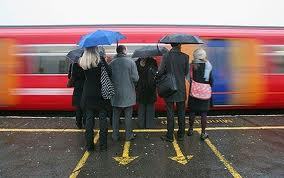
I had to get a rush-hour train this morning. This is something I rarely need to do, and usually manage to avoid, so it’s always fascinating to me to watch how other people behave on their way to work. It was cold, windy and wet in London so I wasn’t anticipating many happy, smiling faces.
But what struck me was that everyone seemed to be in a hurry, whether or not they needed to be. One man ducked past me at speed on his way down the station steps, nearly knocking me sideways, even though the next train didn’t leave for six minutes. Others sped down the platform, staring anxiously at the station indicators.
What did they think was going to happen if (God forbid) the train was a couple of minutes late? Is it because they are living in this metaphor called The Rush Hour that they feel they have to rush?
I first read about hurry sickness in one of Robert Holden’s books, and now it seems to be gaining credence in psychological circles. If you have hurry sickness you suffer from excessive time urgency, rushing when it’s not necessary to rush – and not even realising you’re doing it.
People who are sick with hurry are more likely to suffer from stress, and find it almost impossible to be present. They are always thinking about the future, about where they need to be next.
There’s no known cure for hurry sickness – at least, not if you have told yourself you have to travel in the rush hour every day to get to a job you don’t really want to do to pay for a mortgage you wish you hadn’t taken out.
The best chance of recovery from hurry sickness is this: let the train leave the station without getting on. See how it feels. Are you panicking? Is the anxiety really about the train you’ve missed or is it something much deeper than that? Are you hiding from something you’d rather not face?
To mangle the title of a popular song – don’t hurry, be happy.
Leave a Reply